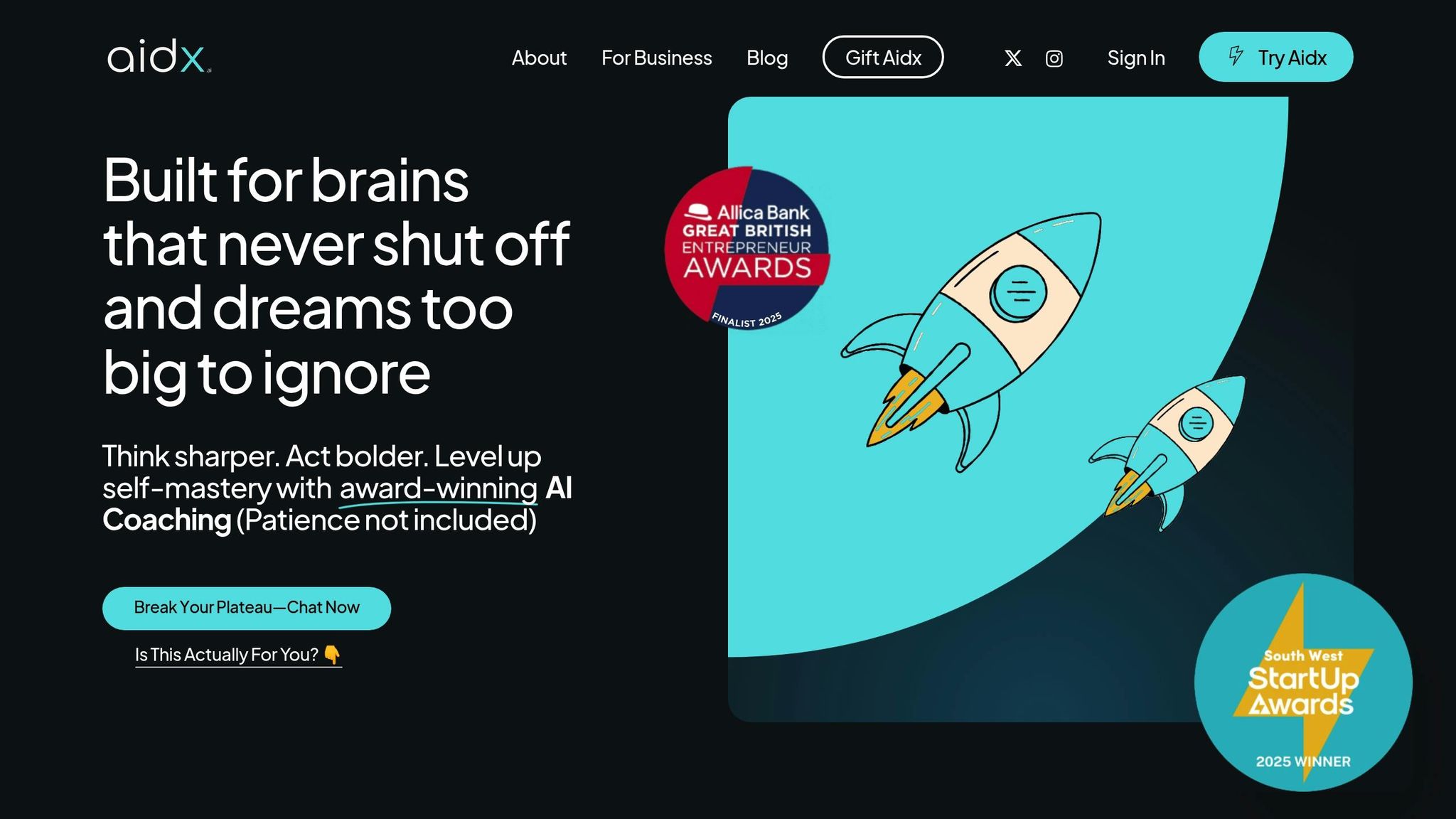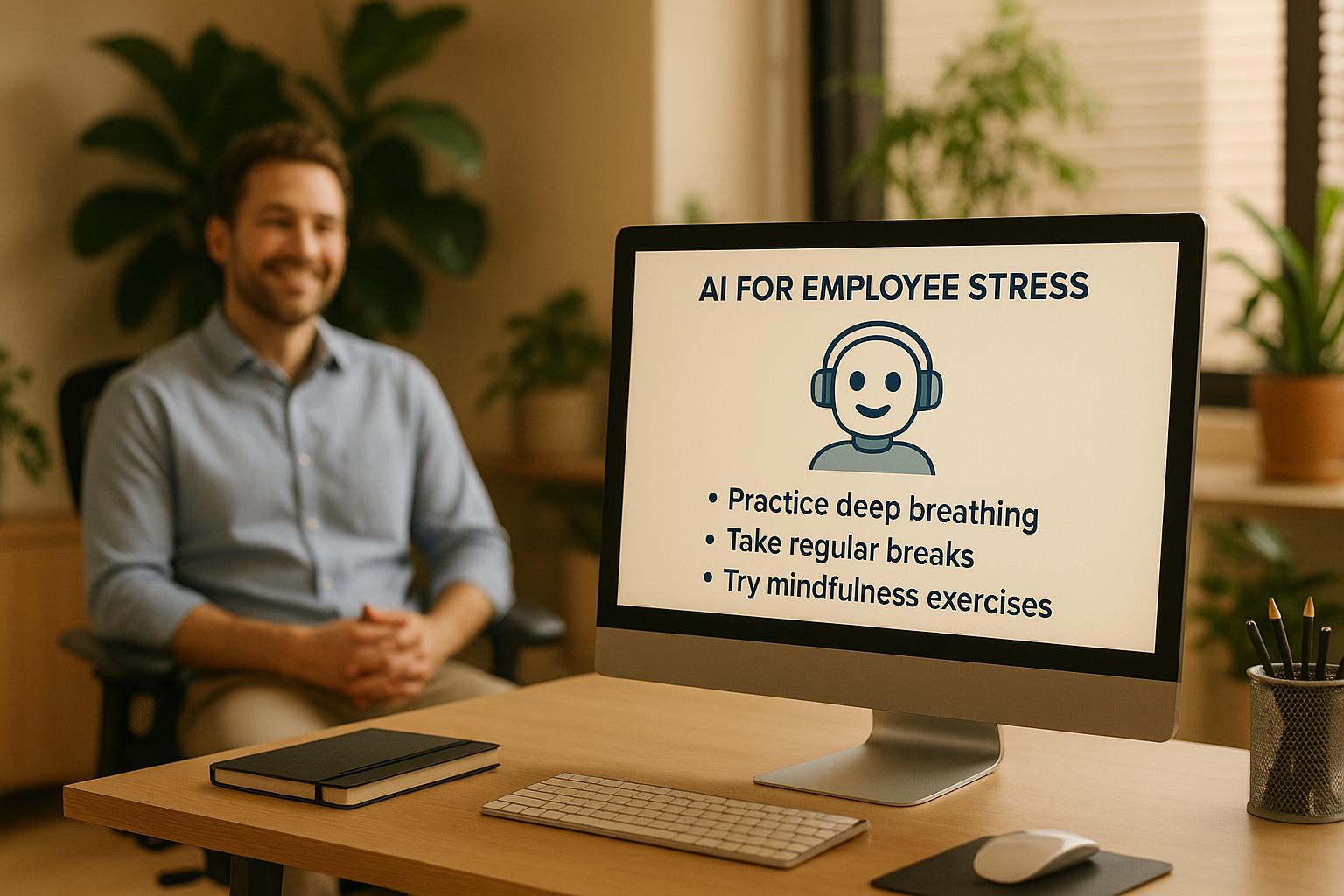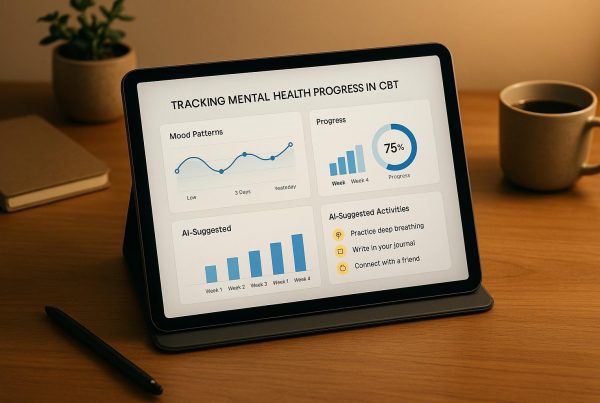When it comes to workplace stress, traditional methods like surveys and counseling sessions often fall short. Stress levels fluctuate daily, and employees need real-time, personalized support. This is where AI steps in, offering continuous monitoring, instant assistance, and actionable insights for both employees and companies.
Key Takeaways:
- Workplace Stress Is Rising: Remote work, constant digital connectivity, and industry-specific pressures are driving stress levels higher.
- Traditional Solutions Miss the Mark: Annual surveys and rigid programs fail to address stress early or in real time.
- AI Offers Real-Time Support: Tools like Aidx.ai provide 24/7 assistance, track stress through voice and data analysis, and tailor solutions for individual needs.
AI-driven platforms not only assist employees but also help HR teams identify stress trends and improve workplace conditions – all while safeguarding privacy. This shift is transforming how companies manage mental health, boosting productivity and retention while reducing burnout.
How AI Helps Reduce Burnout and Improve Employee Wellbeing
Main Problems in Managing Workplace Stress
Even with growing awareness of workplace stress, many companies still struggle to provide effective mental health support. The issue goes beyond offering wellness programs or hiring counselors. Complex barriers often prevent employees from seeking help when they need it most, and unmanaged stress can drain company resources. Let’s explore the key challenges employees face when accessing mental health support and the heavy toll stress takes on organizations.
What Stops Employees from Getting Mental Health Help
One of the biggest hurdles is workplace stigma. Many employees fear that admitting to stress could damage their professional image or career prospects. This is especially true in competitive environments, where vulnerability is often perceived as weakness.
Personal fears and professional risks further complicate the situation. Employees might avoid addressing stress-related issues out of concern for being judged by colleagues or facing negative consequences during performance reviews or organizational changes.
Accessibility is another major barrier. Limited support hours can make it difficult for employees with unconventional schedules – such as shift workers or remote employees – to access help. Geographic challenges also play a role, especially for those in rural areas or smaller cities where qualified mental health professionals might be scarce.
Generational differences add another layer of complexity. Younger employees, like Gen Z and millennials, are typically more open to discussing mental health. They often prefer quick, tech-based solutions like texting or on-demand support. On the other hand, older employees may lean toward traditional counseling and might be less willing to acknowledge stress-related issues. These differing preferences make it challenging for companies to design programs that meet the needs of a diverse workforce.
Cultural and language differences can also make accessing help more difficult. Employees from non-native English-speaking backgrounds may view stress or anxiety differently based on cultural norms, and language barriers can prevent them from fully engaging with available resources.
What Stress Costs Companies
While personal barriers hinder employees from seeking help, unmanaged stress comes at a steep cost to businesses. Stress contributes to increased sick days and lower productivity, placing additional strain on resources.
One hidden cost is reduced productivity, often called "presenteeism." This occurs when employees show up to work but perform at a much lower capacity due to stress.
Stress-related burnout also leads to higher employee turnover, which can be expensive. Recruiting, training, and onboarding new hires take time and money, and productivity often dips during these transitions.
Healthcare costs are another financial burden. Stress can lead to higher insurance premiums and more frequent use of medical benefits. Companies may also face legal and compliance risks, such as workers’ compensation claims or penalties for failing to provide adequate mental health support.
The effects of workplace stress ripple through team dynamics and company culture. High-stress environments often experience more conflict, reduced collaboration, and lower employee engagement. These issues can hurt customer service, stifle innovation, and weaken the company’s competitive position. For roles that involve direct customer interaction, stressed employees may deliver inconsistent performance, potentially damaging customer relationships and impacting revenue.
How AI Solves Workplace Stress Problems
Artificial intelligence tackles workplace stress by addressing key issues that traditional methods often overlook. Unlike conventional wellness programs that depend on scheduled appointments or reactive measures, AI offers continuous monitoring and instant support when employees need it most.
How AI Monitors Stress in Real-Time
AI-powered platforms can track stress levels in real time using tools like voice interfaces and self-monitoring features. These systems analyze vocal cues and self-reported data, such as emotional states, confidence levels, and performance metrics, to create a detailed well-being profile. They can even detect subtle shifts in speech patterns that might indicate rising stress.
This real-time monitoring goes beyond periodic surveys, providing immediate insights and timely support. By staying alert to changes as they happen, AI ensures employees get the help they need exactly when they need it.
How AI Systems Learn and Adapt
Platforms like Aidx.ai use Adaptive Therapeutic Intelligence to tailor support for each employee. Over time, the system learns about an individual’s communication style, stress triggers, and preferred coping strategies. It refines its approach by analyzing how users respond to evidence-based methods, such as Cognitive Behavioral Therapy (CBT), Acceptance and Commitment Therapy (ACT), or Dialectical Behavior Therapy (DBT).
This continuous learning allows the AI to adjust dynamically, ensuring its guidance remains effective as circumstances evolve. With voice-enabled features, employees can interact naturally with their AI coach, receiving personalized advice that integrates seamlessly into their daily routines. This adaptability not only helps individuals but also provides HR teams with actionable insights to enhance workplace well-being.
How AI Helps HR Teams and Managers
AI reshapes how HR teams and managers handle workplace stress by offering valuable insights while maintaining employee privacy. Real-time data reveals trends in overall well-being across the organization, enabling HR to make informed, proactive decisions.
Executive dashboards provide an overview of stress indicators within different teams, helping HR professionals address issues like workload balance, deadlines, and resource allocation. With access to confidential, aggregated data, managers can identify when to step in with support or when to encourage productivity.
sbb-itb-d5e73b4
Case Study: How Aidx.ai Addresses Employee Stress

This case study highlights how Aidx.ai tackles workplace mental health challenges that traditional methods often overlook. By leveraging AI-driven solutions, the platform offers a fresh approach to supporting employee well-being.
Aidx.ai Features for Employee Support
At the heart of Aidx.ai’s platform lies its Adaptive Therapeutic Intelligence (ATI) System™, a proprietary technology designed to understand and adapt to each employee’s unique needs. Over time, this system learns an individual’s communication style, emotional patterns, and stress triggers. Using techniques like CBT, ACT, and DBT, the ATI System™ adjusts its responses in real-time to provide effective support when stress levels rise.
The platform also includes real-time stress monitoring tools, allowing employees to track their emotional states, confidence levels, and performance metrics. With a voice-enabled interface, employees can have natural, on-the-go conversations, whether they’re commuting, taking a break, or working remotely.
Aidx.ai ensures 24/7 availability, addressing the common issue of timing in mental health support. Employees can set goals, receive reminders, and track their progress through push notifications and email alerts. The platform also offers specialized modes tailored to different needs: Life for personal wellness, Business for leadership development, and Performance for maximizing productivity. This flexibility ensures targeted support, whether someone is managing work-life balance or aiming for career growth.
Custom Business Solutions
For organizations, Aidx.ai provides executive dashboards that offer team-wide insights while safeguarding individual privacy. These dashboards track key metrics like work satisfaction, burnout risk, and work-life balance, giving HR and management actionable data to improve workplace conditions.
The platform’s team analytics uncover patterns that traditional surveys might miss. For instance, if stress indicators spike in a particular department during certain periods, managers can address potential issues like workload or deadlines before they escalate.
Aidx.ai combines AI-driven support with hybrid care models. If the system detects that an employee needs more than AI-based coaching, it facilitates connections with HR or external mental health professionals. This ensures that while AI manages day-to-day stress, complex cases receive the human attention they require.
Organizations can also customize the platform to fit their company culture and wellness initiatives. Features like broadcast messaging allow HR teams to send timely updates or resources during high-stress periods. All of this is built on a strong privacy framework that fosters employee trust.
Privacy and Security: Earning Employee Trust
Privacy is central to Aidx.ai’s design, ensuring employees feel secure using the platform. Personal data remains confidential, with no human oversight unless legally mandated.
The platform employs encrypted, GDPR-compliant protocols to protect sensitive information. An optional incognito mode adds another layer of privacy by automatically clearing messages and progress after 30 minutes of inactivity.
This commitment to privacy is key to the platform’s success. Employees are more likely to engage when they know their mental health discussions won’t impact performance reviews or job security. Aggregated data shared with management excludes individual identifiers, focusing solely on trends and patterns to guide workplace improvements.
Aidx.ai’s creators bring decades of expertise in coaching, therapy, AI engineering, and cybersecurity. From day one, privacy protections were a core part of the system’s design, ensuring they remain robust even as the platform expands to serve larger organizations.
Old Methods vs. AI-Powered Stress Management
The way companies tackle workplace stress has come a long way, but many still cling to outdated methods that no longer meet the demands of today’s fast-paced work environment. Let’s take a closer look at how traditional approaches stack up against AI-driven solutions like Aidx.ai.
For years, stress management programs relied on Employee Assistance Programs (EAPs), scheduled counseling sessions, and occasional wellness workshops. These methods were fine when workplace stress was simpler, and work schedules were more predictable. But with 83% of U.S. workers now reporting stress and over 80% projected to be at risk of burnout by 2025 [1][2], it’s clear the old ways just aren’t cutting it anymore.
The main issue with these traditional methods is that they’re reactive. They usually step in after stress has already spiraled into bigger mental health challenges. By the time help arrives, the damage is often done.
AI-powered tools like Aidx.ai flip the script. Instead of waiting for scheduled appointments, these systems provide real-time, 24/7 support. Whether it’s through voice or text, employees can access coping strategies, breathing exercises, or cognitive behavioral techniques tailored to their specific needs – right when they need them most.
Comparing Traditional vs. AI-Driven Methods
The differences between these approaches become even clearer when you break them down:
| Feature | Traditional Methods | AI-Powered Solutions (Aidx.ai) |
|---|---|---|
| Response Time | Delayed appointments | Instant, 24/7 availability |
| Personalization | One-size-fits-all programs | Tailored support based on individual data |
| Scalability | Limited by counselor availability | Unlimited capacity for any workforce size |
| Business Impact | Slow ROI and hard-to-measure outcomes | Data-driven insights with measurable results |
| Privacy Protection | Potential HR involvement | Encrypted, GDPR-compliant, with optional incognito mode |
| Cost Structure | High per-employee costs | Scalable pricing with better cost efficiency |
Response time is a game-changer. Traditional EAPs often require employees to call during business hours, wait for callbacks, and schedule appointments days – or even weeks – later. In contrast, AI systems offer immediate help, whether it’s during a late-night work crunch or an early morning commute.
Aidx.ai’s Adaptive Therapeutic Intelligence (ATI) System™ takes things further by learning each employee’s communication style, emotional triggers, and response patterns. Over time, it gets better at delivering the right kind of support in the right way.
Scalability is another major advantage. Traditional programs are limited by the number of available counselors. Adding hundreds of new employees might mean hiring more staff, which drives up costs. AI-powered platforms, however, can handle growth effortlessly, ensuring every employee gets the care they need without straining resources.
The business impact is also hard to ignore. While traditional programs often struggle to prove their value, AI solutions like Aidx.ai provide detailed analytics on stress trends, intervention success, and employee engagement. Companies can track tangible improvements, such as lower absenteeism, higher job satisfaction, and reduced burnout risk.
Privacy concerns are another sticking point for traditional methods. Employees may avoid EAP services out of fear that seeking help could label them as “problematic” or harm their performance reviews. Aidx.ai addresses this by offering encrypted, GDPR-compliant interactions and an optional incognito mode, which automatically clears sensitive conversations.
Then there’s the cost factor. Workplace burnout costs U.S. businesses $322 billion annually in lost productivity [2][3]. Traditional methods require significant spending on human resources, facilities, and administration. AI-powered solutions, on the other hand, offer predictable pricing and better outcomes at lower per-employee costs. These savings directly contribute to higher productivity and employee retention.
AI-driven stress management is also better suited to today’s workforce. Remote employees, for instance, face a 20% higher risk of burnout, and Gen Z workers are hitting peak burnout by age 25 [2]. Traditional office-based programs can’t effectively support employees spread across different locations and time zones. AI platforms, however, can deliver consistent care anytime, anywhere.
This shift – from reactive, scheduled interventions to proactive, always-available support – marks a major evolution in workplace mental health strategies. Companies adopting AI-powered solutions are not only safeguarding their employees’ well-being but also reaping measurable benefits in productivity, retention, and overall performance.
Conclusion: AI as the Future of Workplace Mental Health
With workplace stress and burnout on the rise across the U.S., the need for effective, real-time mental health solutions has never been more urgent. Traditional approaches often fall short when it comes to addressing the fast-paced demands of modern work environments. This is where AI steps in.
AI-powered platforms like Aidx.ai provide around-the-clock, personalized support, adapting to users’ needs in real time. These tools not only help individuals maintain their well-being but also contribute to better team dynamics and measurable improvements in productivity. Companies leveraging AI for stress management gain access to actionable analytics, enabling smarter decisions that enhance employee satisfaction, retention, and overall performance.
By prioritizing mental health through secure and stigma-free AI solutions, organizations create an environment where employees feel supported without fear of judgment or professional consequences.
Adopting AI-driven mental health tools isn’t just a smart move – it’s essential for companies aiming to attract and keep top talent in today’s competitive landscape. The technology to build healthier, more productive teams is already here, offering businesses a chance to lead the way in workplace wellness.
AI is reshaping the future of workplace mental health. Now is the time to harness its potential and create resilient, thriving teams.
FAQs
How does AI protect employee privacy while tracking stress in real time?
AI protects employee privacy through advanced encryption that secures sensitive data and by anonymizing personal information to maintain confidentiality. Only authorized personnel have access to the system, and it adheres to strict privacy regulations such as the GDPR.
On top of that, self-learning AI adjusts to user behavior while keeping individual details hidden, ensuring stress monitoring stays both private and secure.
How does Aidx.ai cater to different generational preferences for mental health support?
Aidx.ai caters to the needs of different generations by offering a range of customizable features. These include Default Mode for everyday use, Microcoaching for quick, actionable tips, Embodiment Mode for more emotionally engaging interactions, and Incognito Mode for private, discreet conversations. These options allow users of all ages to have a personalized and comfortable experience.
With its Adaptive Therapeutic Intelligence (ATI) System™, Aidx.ai continuously learns from individual preferences, providing support that’s aligned with each user’s unique communication style and comfort zone.
How can companies evaluate the success of AI-based stress management tools compared to traditional approaches?
Companies can measure the effectiveness of AI-driven stress management tools by analyzing clear, measurable outcomes – such as lower stress levels, better emotional health, and increased employee engagement. Platforms like Aidx.ai come equipped with self-monitoring tools that gather real-time data, offering ongoing insights into employees’ mental health.
Unlike traditional methods, such as occasional surveys, AI solutions provide dynamic, real-time monitoring. This capability helps organizations spot stress patterns and address issues early. By comparing these real-time insights to results from older approaches, businesses can gain a clearer picture of how these tools influence employee well-being and productivity. With this data, leaders can make smarter, more targeted decisions to support their teams.



